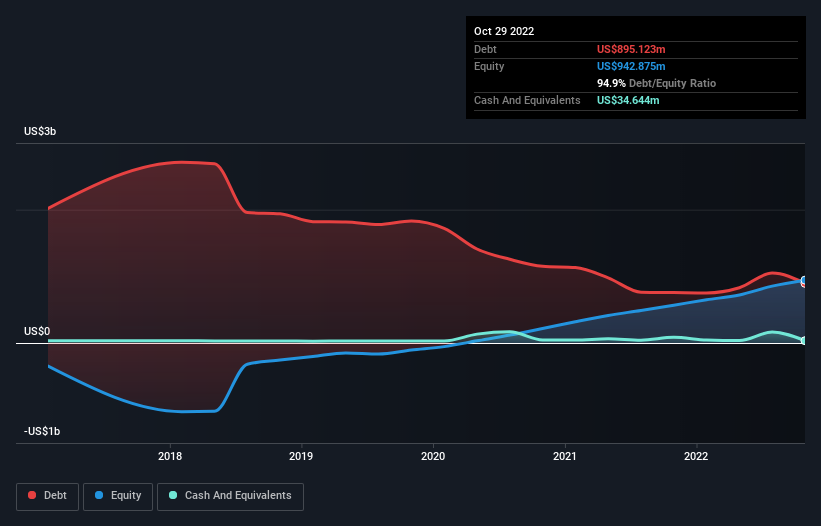- United States
- /
- Food and Staples Retail
- /
- NYSE:BJ
BJ's Wholesale Club Holdings (NYSE:BJ) Seems To Use Debt Quite Sensibly

Legendary fund manager Li Lu (who Charlie Munger backed) once said, 'The biggest investment risk is not the volatility of prices, but whether you will suffer a permanent loss of capital.' When we think about how risky a company is, we always like to look at its use of debt, since debt overload can lead to ruin. As with many other companies BJ's Wholesale Club Holdings, Inc. (NYSE:BJ) makes use of debt. But is this debt a concern to shareholders?
What Risk Does Debt Bring?
Debt and other liabilities become risky for a business when it cannot easily fulfill those obligations, either with free cash flow or by raising capital at an attractive price. In the worst case scenario, a company can go bankrupt if it cannot pay its creditors. However, a more common (but still painful) scenario is that it has to raise new equity capital at a low price, thus permanently diluting shareholders. Of course, the upside of debt is that it often represents cheap capital, especially when it replaces dilution in a company with the ability to reinvest at high rates of return. When we think about a company's use of debt, we first look at cash and debt together.
See our latest analysis for BJ's Wholesale Club Holdings
What Is BJ's Wholesale Club Holdings's Debt?
As you can see below, at the end of October 2022, BJ's Wholesale Club Holdings had US$895.1m of debt, up from US$756.5m a year ago. Click the image for more detail. However, it also had US$34.6m in cash, and so its net debt is US$860.5m.

A Look At BJ's Wholesale Club Holdings' Liabilities
We can see from the most recent balance sheet that BJ's Wholesale Club Holdings had liabilities of US$2.60b falling due within a year, and liabilities of US$2.94b due beyond that. Offsetting this, it had US$34.6m in cash and US$252.0m in receivables that were due within 12 months. So its liabilities total US$5.25b more than the combination of its cash and short-term receivables.
While this might seem like a lot, it is not so bad since BJ's Wholesale Club Holdings has a huge market capitalization of US$10.1b, and so it could probably strengthen its balance sheet by raising capital if it needed to. But we definitely want to keep our eyes open to indications that its debt is bringing too much risk.
In order to size up a company's debt relative to its earnings, we calculate its net debt divided by its earnings before interest, tax, depreciation, and amortization (EBITDA) and its earnings before interest and tax (EBIT) divided by its interest expense (its interest cover). Thus we consider debt relative to earnings both with and without depreciation and amortization expenses.
BJ's Wholesale Club Holdings's net debt is only 0.94 times its EBITDA. And its EBIT covers its interest expense a whopping 16.9 times over. So you could argue it is no more threatened by its debt than an elephant is by a mouse. And we also note warmly that BJ's Wholesale Club Holdings grew its EBIT by 15% last year, making its debt load easier to handle. There's no doubt that we learn most about debt from the balance sheet. But it is future earnings, more than anything, that will determine BJ's Wholesale Club Holdings's ability to maintain a healthy balance sheet going forward. So if you're focused on the future you can check out this free report showing analyst profit forecasts.
Finally, a company can only pay off debt with cold hard cash, not accounting profits. So the logical step is to look at the proportion of that EBIT that is matched by actual free cash flow. Over the last three years, BJ's Wholesale Club Holdings recorded free cash flow worth a fulsome 80% of its EBIT, which is stronger than we'd usually expect. That positions it well to pay down debt if desirable to do so.
Our View
The good news is that BJ's Wholesale Club Holdings's demonstrated ability to cover its interest expense with its EBIT delights us like a fluffy puppy does a toddler. But truth be told we feel its level of total liabilities does undermine this impression a bit. When we consider the range of factors above, it looks like BJ's Wholesale Club Holdings is pretty sensible with its use of debt. While that brings some risk, it can also enhance returns for shareholders. When analysing debt levels, the balance sheet is the obvious place to start. However, not all investment risk resides within the balance sheet - far from it. To that end, you should be aware of the 1 warning sign we've spotted with BJ's Wholesale Club Holdings .
When all is said and done, sometimes its easier to focus on companies that don't even need debt. Readers can access a list of growth stocks with zero net debt 100% free, right now.
Valuation is complex, but we're here to simplify it.
Discover if BJ's Wholesale Club Holdings might be undervalued or overvalued with our detailed analysis, featuring fair value estimates, potential risks, dividends, insider trades, and its financial condition.
Access Free AnalysisHave feedback on this article? Concerned about the content? Get in touch with us directly. Alternatively, email editorial-team (at) simplywallst.com.
This article by Simply Wall St is general in nature. We provide commentary based on historical data and analyst forecasts only using an unbiased methodology and our articles are not intended to be financial advice. It does not constitute a recommendation to buy or sell any stock, and does not take account of your objectives, or your financial situation. We aim to bring you long-term focused analysis driven by fundamental data. Note that our analysis may not factor in the latest price-sensitive company announcements or qualitative material. Simply Wall St has no position in any stocks mentioned.
About NYSE:BJ
BJ's Wholesale Club Holdings
Operates warehouse clubs on the eastern half of the United States.
Adequate balance sheet and fair value.


